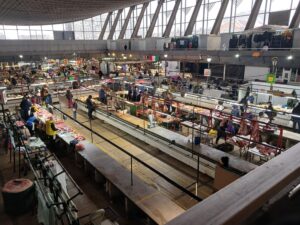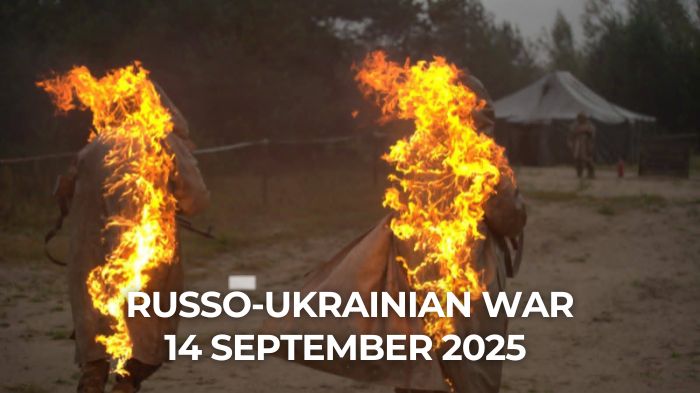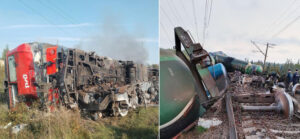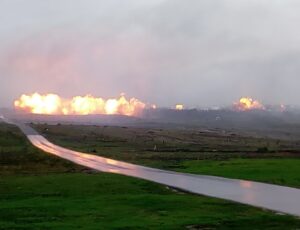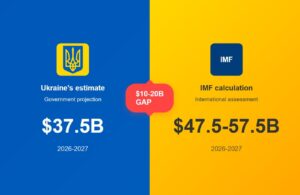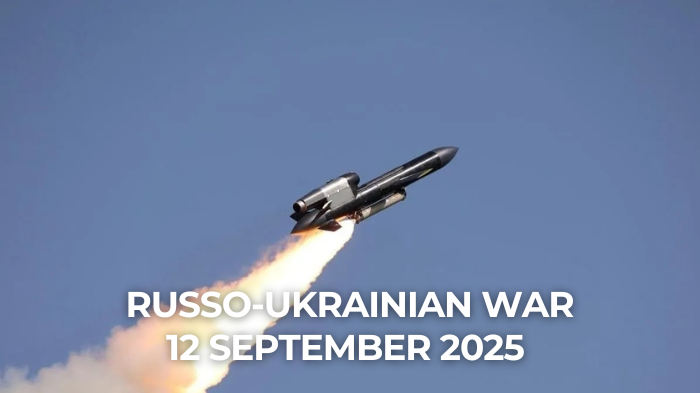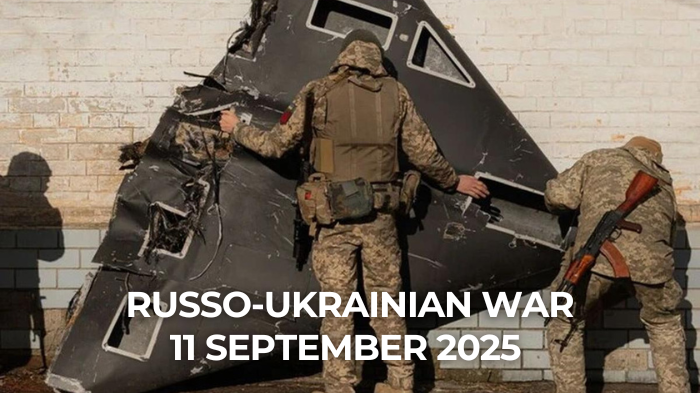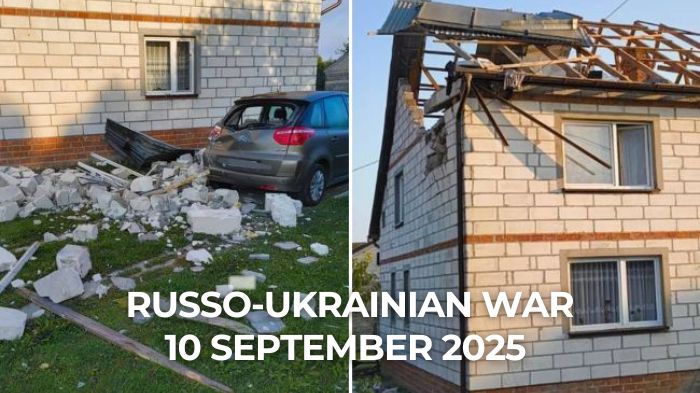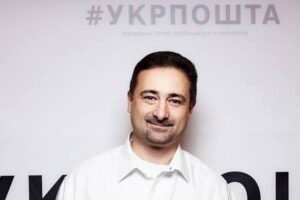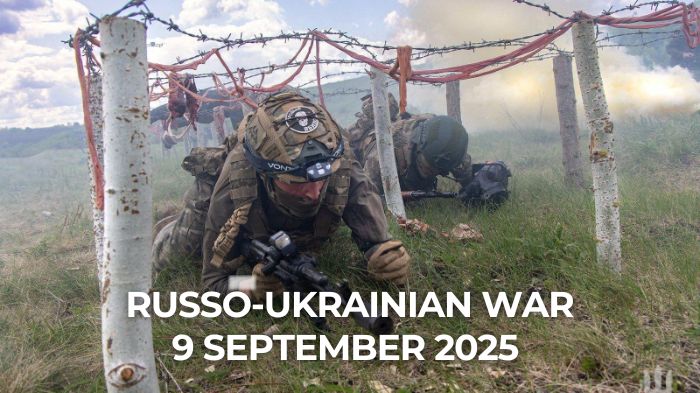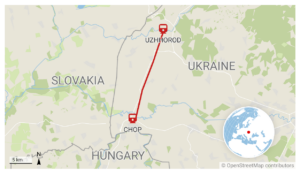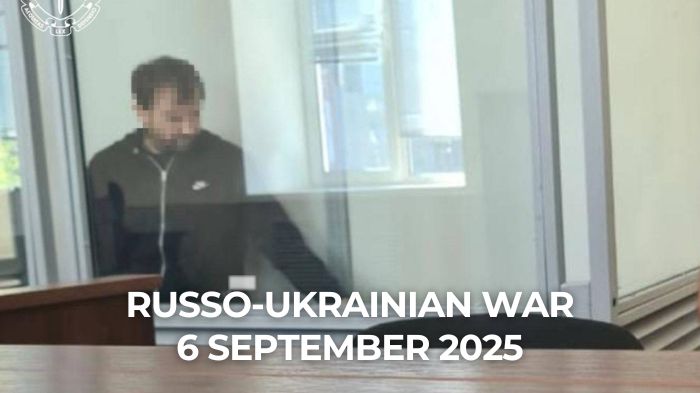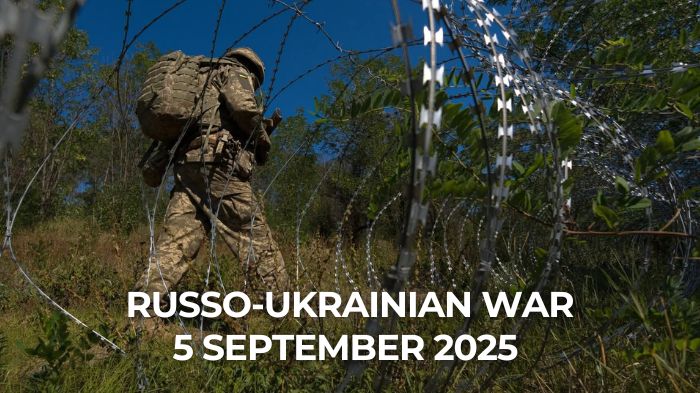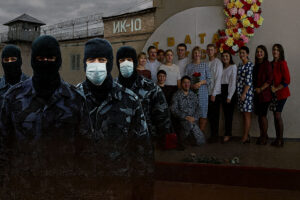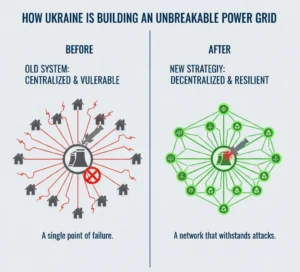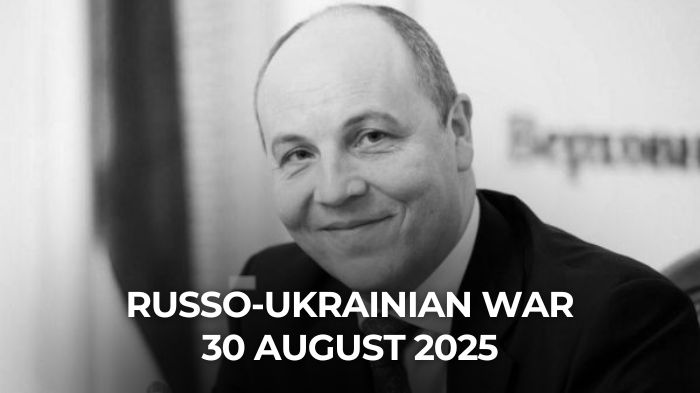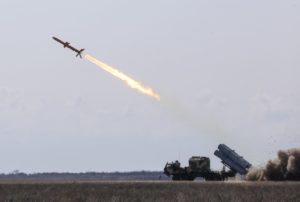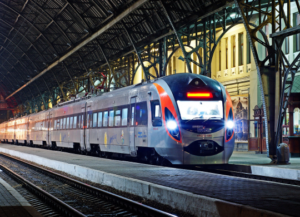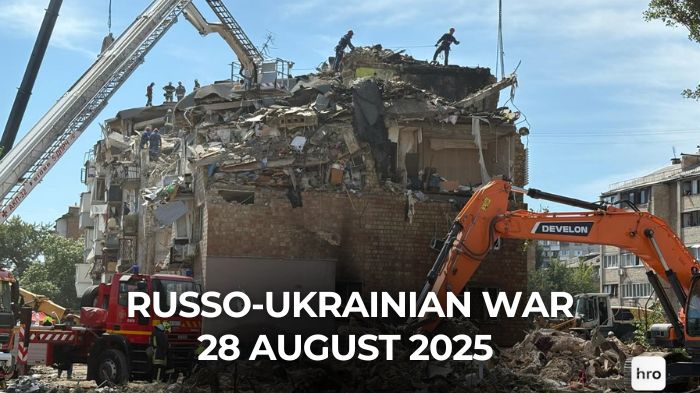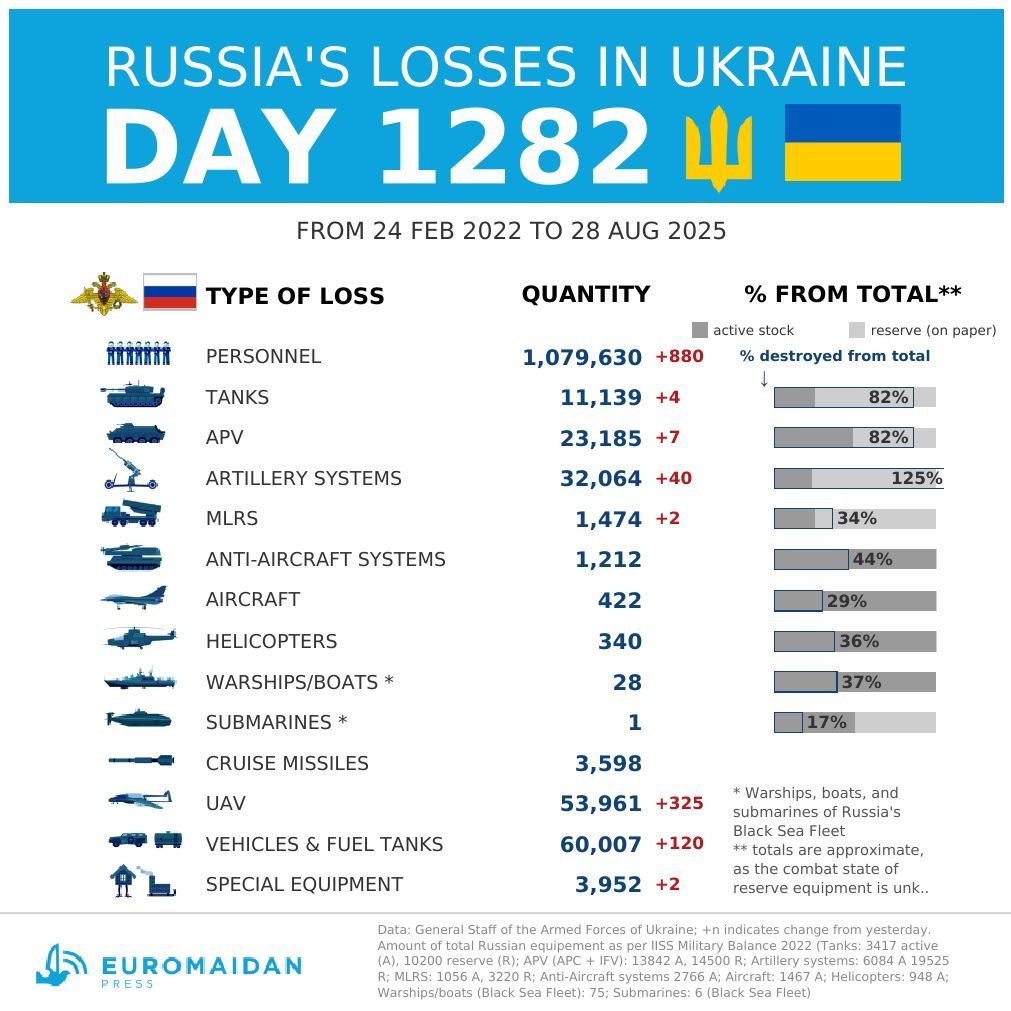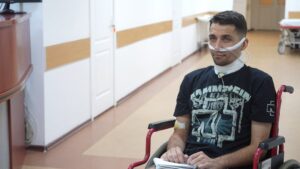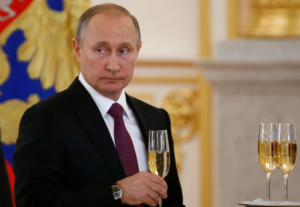Russo-Ukrainian war, day 1301: Ukraine Strikes Deep Into Russia While Advancing in Sumy

Exclusives
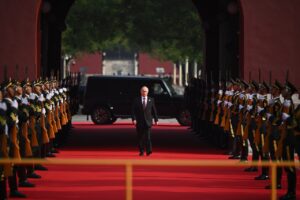 |
Bloomberg thinks Putin finally went too far (he didn’t). Bloomberg asks if Putin finally went too far—we examine why it’s likely more of the same. |
 |
BBC: Ukrainian civilian freed after years in Russian captivity — his story is one of beatings, starvation, and survival. Journalist Dmytro Khyliuk spent three and a half years in captivity without charges before finally returning home in a rare swap. |
 |
Ukraine asks West to fund half its government as defense spending hits record 27% of GDP. $10 billion gap tests whether Western taxpayers can sustain Ukraine’s unprecedented military mobilization through 2026. |
 |
Ukrainian troops are on the attack in Sumy—and advancing. Moscow stripped troops from Sumy to double down on its attack in Donetsk. For Kyiv, that was an opportunity. |
Military
Ukrainian troops are on the attack in Sumy—and advancing
Moscow stripped troops from Sumy to double down on its attack in Donetsk. For Kyiv, that was an opportunity.
“Deliberately terrorizing our people” – Russian strike on Zaporizhzhia kills 2, injures 20
Ukrainian officials call for more Western support for Ukraine’s air defence after another large-scale Russian aerial assault.
Frontline vs. drones: border guards of Ukraine share how to neutralize fiber-optic UAVs
Soldiers explained that sometimes even ordinary scissors are enough to cut the fiber cable and stop UAV.
Russian drone hits Kharkiv Pharmaceutical University, 4 injured in morning attack
A Russian drone strike damaged the roof of Kharkiv’s Pharmaceutical University and sparked a 150-square-meter fire.
Belarus claims it practiced deploying Oreshnik during Zapad-2025
Belarus announced it practiced deploying nuclear-capable weapons systems for the first time during joint military exercises that prompted 3 neighboring countries to seal their borders.
Ukraine unveils VATAG — a battlefield ground drone that can haul over 2 tons and stay quiet doing it
The robotic system blends logistics capacity with stealth operations using a hybrid drive and autonomous control.
Estonia is digging a 40 km trench to stop Russian tanks — and 600 bunkers are next
ERR reports the Baltic defense line project is already reshaping the southeast frontier.
Ukraine warns NATO: learn our drone war tactics before it’s too late
Ukraine’s drone war experience could save NATO from Russia’s next move.
Ukraine says it struck Russia’s Saratov oil refinery; sources claim Kstovo refinery hit too
The attacks are part of Ukraine’s systematic effort to cripple Russia’s ability to fuel its war.
Explosions hit military hub in Russia’s Vladivostok 6,600km from Ukraine
Ukrainian intelligence operatives conducted a sabotage operation in Russia’s Far East port city of Vladivostok, marking another strike over 6,600 km from the Ukrainian border.
Russians disguised as civilians stormed Yampil — Ukrainian forces turned their ambush into a trap
The 11 Army Corps reported that infiltrators hiding in homes and basements were blocked and neutralized.
Ukrainian Forces strike at Russian command posts in Donetsk Oblast after Russian defense minister’s visit
Ukraine targeted Russian command locations that Defense Minister Andrei Belousov had inspected in late August, striking the military posts on 8 Sept. and hitting personnel including command staff.
Frontline report: Russia’s Pokrovsk offensive collapses into chaos — Ukrainian forces seize the moment and liberate Udachne
The long-hyped campaign ended with scattered assaults and troops abandoning vehicles in panic.
Intelligence and Technology
Russia’s new attack drone full of American, European, Chinese components – Ukrainian intelligence
Russia’s new Geran-3 attack drones incorporate dozens of foreign-made parts, showing Moscow still has access to Western technology despite sanctions.
From Telegram to YouTube Comments: Tracing Russian narratives about Ukrainian politician’s murder
Identical narratives blaming Ukrainian leadership for Andriy Parubiy’s murder appeared simultaneously across Russian Telegram channels and in thousands of comments on Ukrainian YouTube videos.
International
War in Ukraine could end within months if Europe targets Russian oil buyers, US treasury chief says
Scott Bessent believes the war could be over in 60 or 90 days if Europe imposes tariffs of 50% to 100% on China and India.
Polish authorities detain 21-year-old Ukrainian, 17-year-old Belarusian for drone flight over government district
Two young foreign nationals face aviation law violations after flying a drone over Polish government buildings and the Belvedere Palace.
ISW: Kremlin escalating rhetoric, threatening NATO states in parallel with the kinetic escalation
Russian Security Council Chairperson Dmitry Medvedev warned on 15 Sept. that NATO enforcement of a no-fly zone over Ukraine would constitute a declaration of war.
Czech ammunition initiative for Ukraine faces political opposition despite delivery success
Former PM Andrej Babiš has branded the Czech Republic’s Ukraine ammunition initiative “rotten” and vowed to scrap the program if his ANO party wins October’s parliamentary elections.
“He understands only force”: Zelenskyy warns Putin plays Trump to escape punishment
The Ukrainian President warned that Russia’s goal is to weaken sanctions, not to end war.
A drone flew over Poland’s presidential residence — two Belarusians are now in custody
The State Protection Service neutralized the device after spotting it above Belweder and nearby government buildings. The incident unfolded on the same day Zapad-2025 military exercises intensified across the border.
Trump’s push to warm relations with Belarus may save Russia’s dying aviation fleet
The lifting of sanctions could let Minsk feed components straight into Moscow’s grounded aircraft.
Humanitarian and Social Impact
Ukraine asks West to fund half its government as defense spending hits record 27% of GDP
$10 billion gap tests whether Western taxpayers can sustain Ukraine’s unprecedented military mobilization through 2026.
76% of Ukrainians believe they can defeat Russia with proper western support, poll shows
KIIS survey data shows 81% of Ukrainians believed in front-line success in September, while 76% now express confidence in overall victory against Russia.
210 Russian facilities identified in systematic “re-education” of Ukrainian children, Yale study reveals
Ukrainian children deported to Russia learn to throw grenades and operate drones at 39 facilities, while 130 others force pro-Russian programs, Yale University study reveals.



